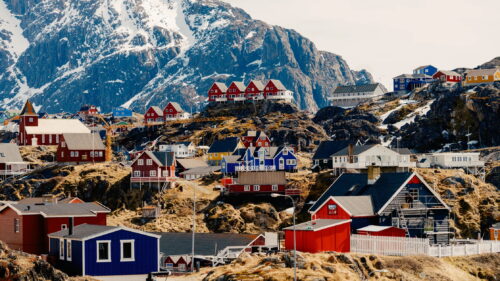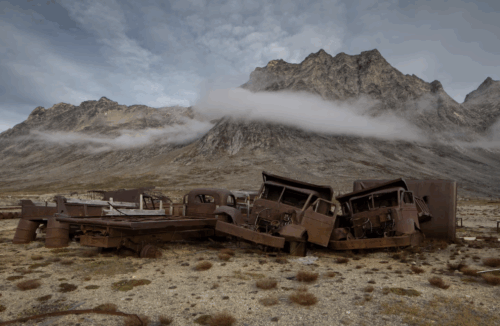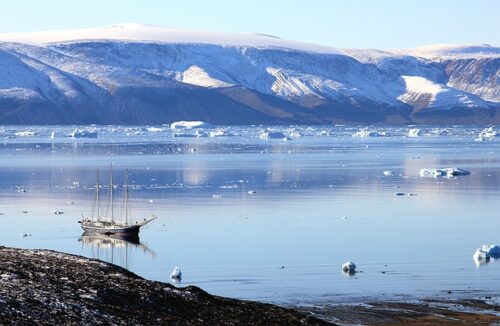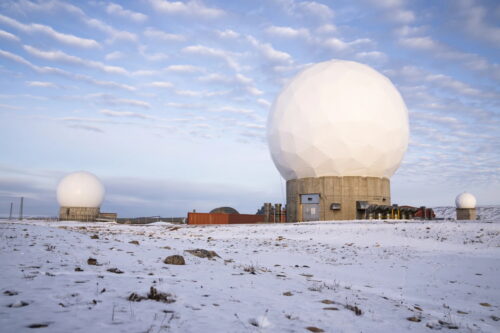

With global tensions escalating since the re-election of Donald Trump, it may seem curious that Greenland — a desolate island of ice, home to fewer than 60,000 inhabitants, has emerged as one of the newest sites of geopolitical contest. Indeed, major players like the United States and China have both set their eyes on the island, each wary of the other’s Arctic ambitions. Washington, under the Trump administration especially, has shown continual interest in Greenland’s fate: in 2019, the U.S president floated the idea of acquiring Greenland — a concept that has since evolved into one of the current administration’s most pressing objectives.
This undulating fascination with Greenland signals a greater value proposition that the island offers: control over newly accessible Arctic shipping lanes opened up by the accelerating effects of climate change, and access to a host of various mineral riches. Consequently, the United States’ persistence in a strategic acquisition of Greenland has sparked serious questions about the island’s political future, and whether it could benefit through deeper ties or even possible integration with the United States. Such a question cannot be answered purely through a geopolitical lens, but also a combination of economics, politics, and ethics.

Where is the future of Greenland headed? Source: newyorker.com
Greenland’s unique history has long positioned itself as an unlikely bridge between Europe and North America. Long before foreign powers turned their gaze northward, the Indigenous Inuit people had carved out a centuries-long existence across Greenland’s frozen landscapes, living as semi-nomadic hunter-gatherers. In the 10th century, viking adventurer Erik the Red, fleeing exile from Iceland, would found the first Norse settlement along the southwest coast. According to legend, Erik christened the island ‘Greenland’, a hopeful, yet misleading, invitation designed to attract more settlers to the island’s unforgiving shores. Greenland’s significance wasn’t limited to that of a distant outpost however, as future Norse expeditions would use it as a springboard for further exploration, and expansion into North America, especially Vinland (modern day Newfoundland). By the early 18th century, Danish colonists formally laid claim to the land, embedding its fate firmly within Europe’s colonial tapestry — a condition that would persist for generations under Danish dominion.
World War II would thrust Greenland’s geographical status from that of a peripheral after-thought, to that of a quiet lynchpin. Following the Nazi invasion, and subsequent occupation of Denmark in 1940, Greenland would find itself in flux, with its political tether to Europe abruptly severed. Under an impromptu 1941 agreement, the United States would commandeer the nation into a strategic military hub: establishing military bases, collecting critical weather intelligence, and harvesting crucial rare materials such as cryolite — transforming Greenland into an unlikely cog in the eventual Allied victory in 1945.

Greenland served as a crucial middle-point linking America and Europe 80 years ago. Source: NationalGeographic
As Greenland entered into the second half of the 20th century, its people would begin to enjoy more autonomy from their former colonial overlords. In 1953, the territory was fully incorporated into the Danish state, ending its colonial status, and by 1979, Greenland would achieve Home Rule — granting the territory its own local parliament to rule over internal affairs. A 2008 referendum for self-governance would pass overwhelmingly, leading to Greenland taking control of almost all internal affairs. Today, Greenland remains an autonomous territory within the Kingdom of Denmark: it governs its domestic theatre independently, yet still cedes control of foreign policy and defence, whilst still enjoying generous subsidies from Copenhagen.

Greenland was a Danish colony from 1721-1953, before being incorporated to Denmark. Source: Reuters
Yet, alongside this development of Greenlandic self-rule, Washington has, many times, approached Denmark over the island territory. As wartime pressures gave way to Cold War anxieties, the Truman administration in 1946 would covertly offer $100 million in gold — an offer rebuffed by the Danish government. Donald Trump’s 2019 suggestion of a Greenland purchase was met similarly with the insistence that Greenland was “not for sale”. Therefore, Washington’s attempt under Trump’s second administration to purchase Greenland, and Denmark’s refusal to do so, reflects the deeper complexities embedded within this seemingly barren icecap — a land that must balance the island’s personal ambitions of autonomy, to those geopolitical ambitions of global powers that surround it.
What makes Greenland’s vast ice expanse of an island so important in the United States’ game plan? At first glance, Greenland might seem like an unlikely prize. However beneath its frozen surface and lonely location lies a treasure trove of strategic resources and economic assets that the major superpowers of the globe have their eyes on.

Greenland has an abundance of natural resources and rare earth elements. Source: earthside.co.uk
A key prize of the island is its vast natural resources. Greenland itself harbours a large untapped reservoir of rare earth elements, with an estimated 1.5 million tons of these precious resources residing in its land. Within these resources include strategic rare earth elements such as Dysprosium and Neodymium, which are all critical for the production of technologies such as electric vehicles, smartphones and military hardware. In a world where the U.S’s economic rivals China controls roughly 70% of global rare earth production and nearly 90% of the processing market, the acquisition of Greenland’s untapped resources could provide the U.S a powerful advantage in the current trade war, allowing them to diversify supply chains and boost technological self reliance. As competition for these materials intensifies, the icy terrain of Greenland becomes less of a barren wasteland and more of a hidden vault of 21st-century power.
However, Greenland’s inherent value doesn’t just lie beneath the surface. As the climate change crisis continues to exacerbate and the Arctic ice melts, new maritime routes are opening up. New shipping paths such as the Northern Sea route could reduce shipping hauls by thousands of miles compared to traditional routes. Gaining control of Greenland would also elevate the U.S into a powerful position to take advantage of the island’s strategic location near the heart of the Arctic crossroads, allowing them to monitor, influence and control the flow of global trade from the north.
Through the eyes of the armed forces, Greenland’s military importance cannot be understated. The U.S operates the Pituffik Space Base, its north-most military outpost, which plays a critical role in missile detection, space surveillance, and Arctic defence. Furthermore, Greenland’s strategic location in the GIUK (Greenland, Iceland and UK) gap makes it a frontline sentinel for tracking Russian naval movements into the Atlantic. As tensions rise in the Arctic and global defence strategies pivot northward, Greenland serves as an unsinkable aircraft carrier in the U.S defence playbook.

Greenland offers vital military importance to NATO keeping Russian naval activities in check. Source: apnews.com
Moreover, the ongoing trade war and longtime rivalry between China and the U.S continues to magnify the island’s importance. China’s “Polar Silk Road” strategy demonstrates its growing ambition in the Arctic arena, with China’s infrastructure investments and mining interests in Greenland viewed by the U.S as an attempt to gain a foothold in a region rich with resources and geopolitical influence. Through investments in Greenland, offering aid and deepening diplomatic ties, the U.S could not only benefit economically but also counter the influence of their rivals.
Greenland currently enjoys a high standard of living under the Danish government, benefiting from Denmark’s comprehensive welfare system, including universal healthcare, free education, and other social services. In contrast, the U.S relies heavily on private healthcare and a less comprehensive social welfare system, which could pose risks to Greenlanders’ quality of life. While U.S investment might boost infrastructure, it may also erode the small close-knit community and remoteness that Greenlanders pride themselves on and enjoy today. Ethically, the notion of purchasing a semi-autonomous territory raises significant concerns, particularly given Greenland’s right to self-determination under international law. Ultimately any discussion about Greenland’s future must prioritise the desires and aspirations of its people.
Greenlanders have overwhelmingly opposed the idea of U.S acquisition. In response to President Trump’s renewed interest in acquiring Greenland, Greenland’s Prime Minister Jens-Frederik Nielsen firmly stated that the U.S will not get Greenland, emphasising the island’s self-governing status and the right of its people to decide their own future. This sentiment is echoed by Greenland’s and Denmark’s political leaders, who continue to reject any attempts at U.S acquisition. The local population values their autonomy and cultural identity, and there is a growing movement toward greater independence, even from Denmark, rather than external rule.

Jens-Frederik Nielsen, Prime Minister of Greenland, has reaffirmed that the island’s future is not open to negotiation. Source: apnews.com
The U.S government’s approach to Greenland has been characterised by strategic and economic interests, with less emphasis on cultural preservation. Proposed bills such as the “Make Greenland Great Again Act” and the “Red, White, and Blueland Act of 2025” reflect a focus on national security and resource exploitation. President Trump expressed confidence in acquiring Greenland, indicating intentions to pursue diplomatic or economic strategies. Such an approach raises concerns about the potential for economic exploitation and the destruction of cultural heritage. Without strong legal protections and respect for Greenland’s traditions, assimilation pressures could endanger the cultural fabric that they have fought to maintain.
With the ever increasing demand for power and control over the globe’s strategic and economic locations, talks have reemerged surrounding the acquisition of Greenland, particularly in regards to the U.S have continued to be of the attention of media outlets, ultimately becoming one of Trump’s key campaign points in his run for the 2025 presidency. Due to Greenland’s geographic location, it holds a key strategic value for global powers from a military perspective, however due to climate change it also holds rights over potentially lucrative shipping routes. Moreover due to Greenland’s remoteness, it still holds many valuable and desirable natural resources. With this being considered, Greenland has become a key target for the U.S However, whilst the acquisition might benefit the U.S, there is much scepticism that it will have a positive impact upon Greenlanders. There are many considerations regarding U.S social services versus progressive Danish welfare, preservation of indigenous culture, and climate related concerns, which has resulted in unified pushback from Greenlanders and their leaders.
The CAINZ Digest is published by CAINZ, a student society affiliated with the Faculty of Business at the University of Melbourne. Opinions published are not necessarily those of the publishers, printers or editors. CAINZ and the University of Melbourne do not accept any responsibility for the accuracy of information contained in the publication.